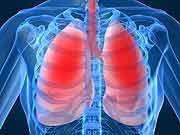
MONDAY, Jan. 9 (HealthDay News) — Combination drug treatment that targets estrogen production significantly reduced the number of tobacco carcinogen-related lung tumors in mice, a new study shows.
“Anti-estrogens have been shown to prevent breast cancer in some women,” Jill Siegfried, a professor in the department of pharmacology and chemical biology at the University of Pittsburgh Cancer Institute, said in an American Association for Cancer Research news release.
“If anti-estrogens can prevent lung cancer as well, this would be a major advance, because these drugs are safe to give for long periods and there are no approved ways to prevent lung cancer,” she added.
Most lung cancers have a type of estrogen receptor that makes tumors grow when they’re exposed to estrogen. In addition, aromatase, an enzyme in the lung, produces estrogen.
Siegfried and her team found that blocking this estrogen receptor and the aromatase enzyme could prevent estrogen-sensitive lung tumors in mice exposed to a tobacco carcinogen.
The study was to be presented Monday at an AACR-International Association for the Study of Lung Cancer joint conference on lung cancer, held in San Diego. With research presented at a medical meeting, the data and conclusions should be viewed as preliminary until published in a peer-reviewed journal.
The findings may eventually lead to a treatment that could greatly reduce ex-smokers’ risk of lung cancer, according to Siegfried.
“We may be able to prevent lung cancer in people who have been previously exposed to tobacco carcinogens using some of the same anti-estrogen drugs that can prevent breast cancer,” she said. “A lot of work needs to be done to determine who would benefit from this therapy, and these drugs would need to be tested in clinical trials in those at high risk for lung cancer.”
While the findings of the new study appear promising, scientists note that research involving animals often fails to produce similar results in humans.
More information
The U.S. National Cancer Institute has more about lung cancer prevention.

